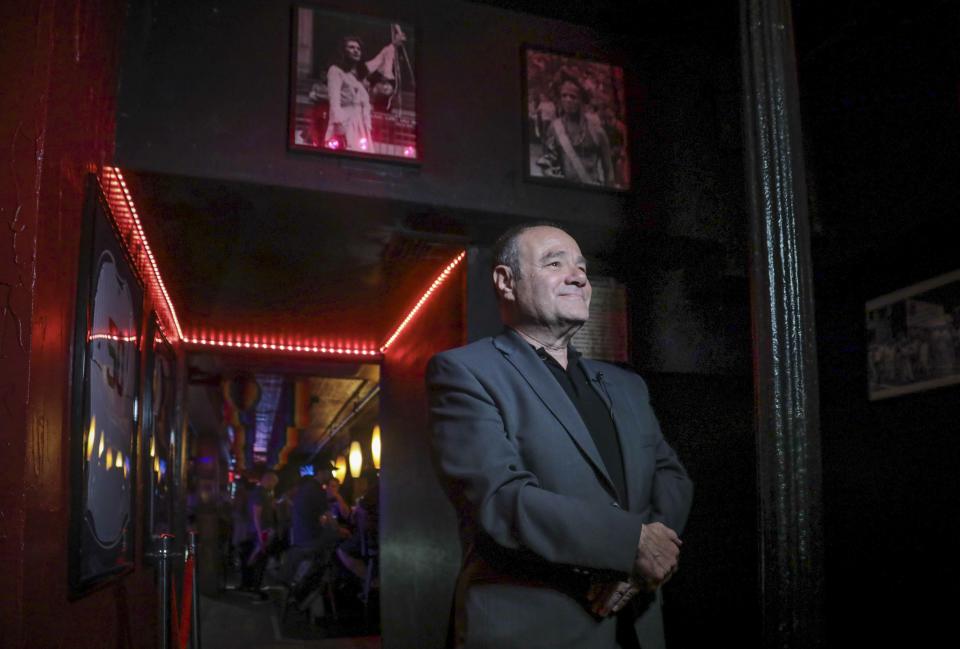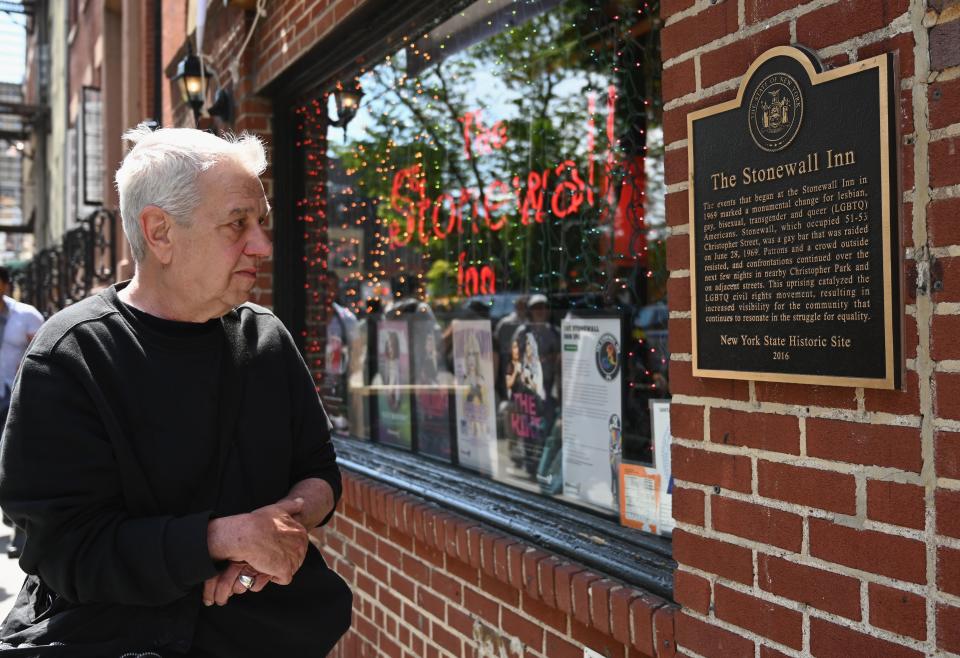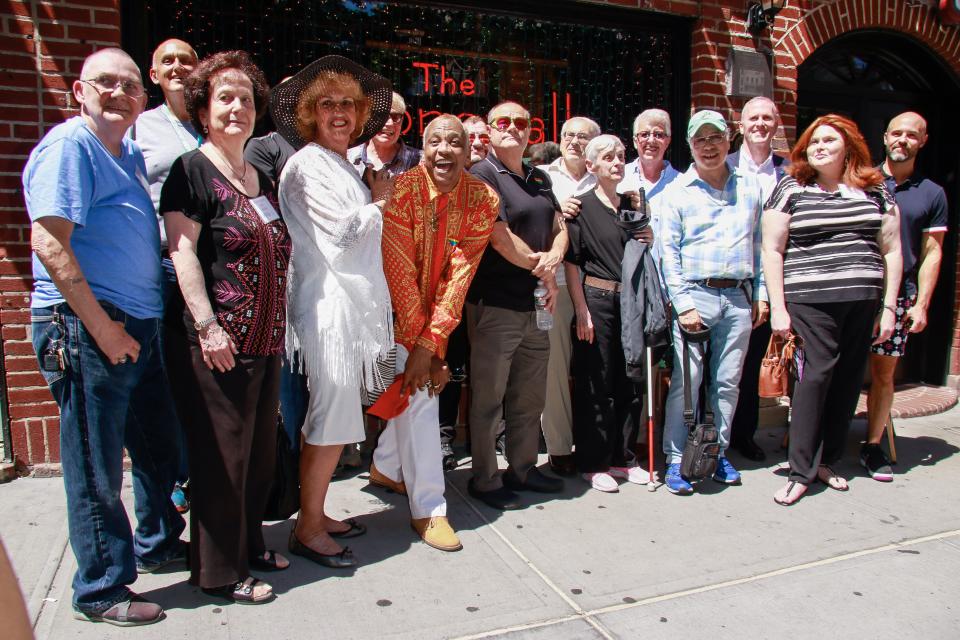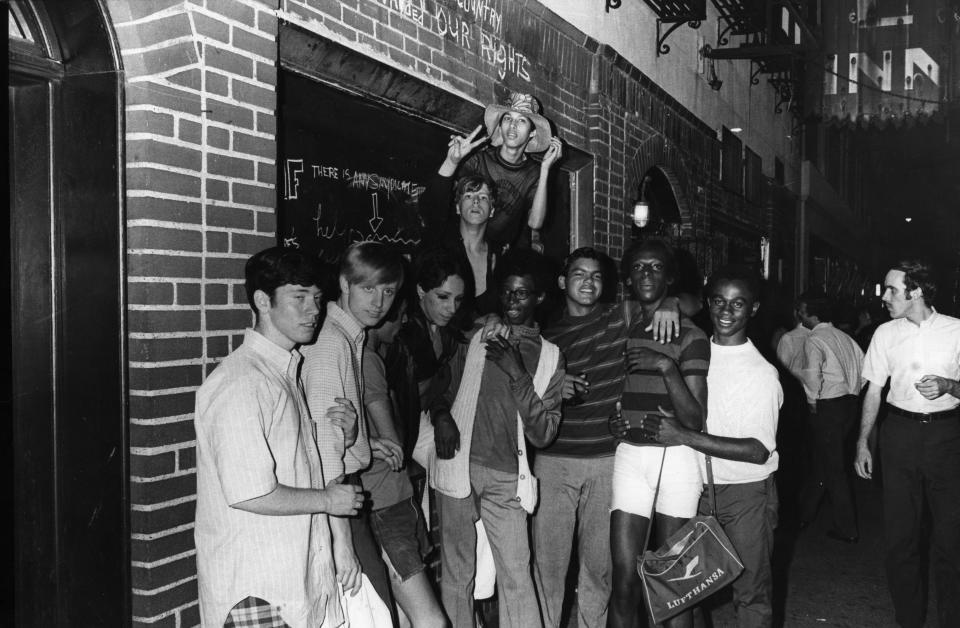'It was the beginning of the end of hiding': LGBTQ community remembers the Stonewall riots of 50 years ago
(Video produced by Gaby Levesque)
On June 28, 1969, the Stonewall Inn, an obscure mob-owned bar in Greenwich Village catering to gay men and lesbians, was raided by police, nominally looking for evidence of liquor-law violations. That was not unusual in itself, but this time the patrons, ordered outside and standing around in the hot summer night, began taunting the cops, then throwing bottles — and soon a small riot erupted, unintentionally touching off what has become a nationwide movement for LGBTQ liberation and equal rights.
Veterans of the riot and some of today's influencers on LGBTQ culture spoke with Yahoo News to recall what happened 50 years ago and the impact one night has had on the world since.
“Before Stonewall, society had control of us and our street. After Stonewall, we had control,” said Mark Segal, who was at the Stonewall the night of the raid. “We took back our street. We imprisoned the police. We threw things at the bar. We controlled that street that evening.”

This wasn't the first time the bar was raided, but anger at the police had reached a tipping point.
At that time, Segal said, gays were arrested on any number of pretexts:
“If a policeman just suspected I was gay. If there were more than three of us congregating on the street. If we were holding hands. If we showed any form of affection. If we talked back to a police officer.” Cross-dressing was a crime in itself, defined, Segal says, as “wearing more than three pieces [of] garments that were from the opposite sex.”
“But they would harass drag queens more than anybody else,” Segal added. “Because they were obvious.”
“Everything changed on June 28,” said Martin Boyce, another Stonewall veteran. “The days of the Mafia owning bars was almost over, it was the beginning of the end. And it was the beginning of the end of hiding.”

Boyce described the scene filled with “smoke, broken glass, smashed windows, debris, cloth, awful smells of burning garbage and some of it not put out yet.”
“It was ugly, he said. “It was a riot.”
“There was not an inkling [that] it was a success,” Boyce continued. “We didn't think on those terms. It was a riot; we had ruined our street. They had raided our bar; we had alienated the police. It was [a mayoral] election year, and we could expect a lot more trouble for our pains, and that didn't happen because the next day everybody thought differently.”
For Boyce, the riots, which lasted six days, weren’t a celebration. “It was an incident that ignited action, but not a movement yet. ... It was like a bunch of people now deciding to fully live their gay lives and that grew, you know, larger and larger. It couldn't be contained.”
“I can't imagine the courage it took to finally stand up,” said Stacy Lentz, a co-owner of the bar, which has reopened and is a national historic landmark. “Especially to fight back against the police and to really say, ‘Hey, we're queer, and you've gotta let us have our place. You've gotta let us have our Stonewall.’”
Lentz and a few other investors bought Stonewall in 2006 “to save history.”
“After the riots in 1969, the bar closed,” said Lentz. “After that time period, over the years, it became a bagel shop, a Chinese restaurant, numerous things. It reopened as a bar in the late ’80s, and then in [1991], it actually became a bar that was called Stonewall.”

“It didn't have running water,” she added. “It was a safe, queer space, but it was not very nice.”
“Without Stonewall, I don't think we would be where we are today in terms of the LGBTQ community. I think we would've had another tipping point, but it wouldn't have been the same. I think that really sped up the process.”
Lentz witnessed the progress in LGBTQ rights in and out of Stonewall after the riots and the 1980s AIDS crisis that over the years has claimed the lives of more than 600,000 Americans, mostly gay men and IV drug users. When “don't ask, don't tell” was overturned in 2008, military members came to the bar in uniform. Three years later, when New York passed a marriage equality law, thousands of people gathered in the park across the street from the bar. And when the Defense of Marriage Act was overturned in 2013, leaders in the equal rights movement, like Edie Windsor, flocked to Stonewall in celebration.
“A lot of our activism started in bars. They're the only safe places that we had to gather, to find lovers or to find friends, our chosen family,” said Lentz, who grew up in a “Christian, conservative, small town in the middle of Kansas” and moved to New York City in 1995 “to live an out, open life.”
“It's incredible seeing young, queer kids light up when they hear the story of Stonewall; for them to understand that history and to really encourage them to get involved and to see them meet their chosen family, to see them dance and have a great time in Stonewall and feel like they're in a safe, queer space,” she said. “This current administration is really attacking the LGBTQ community, and that's why we've got to make sure the story of Stonewall stays alive, and we've got to encourage a younger generation to pick back up where those brave men and women started in 1969 and keep that struggle going, because we could lose it all.”

The Stonewall uprising helped engender the gay liberation movement, which organized against the oppression of LGBTQ people, especially by police. But often forgotten in the retelling of the infamous night and the days that followed are the trans women of color who helped lead the way.
“At the time that I heard about Stonewall, the way it was at least being told, was just a very white gay history story,” said Angelica Ross, a trans woman who plays Candy on the television show “Pose” and is founder and CEO of TransTech Social Enterprises, a company that supports trans people. “Even in hindsight, like seeing some of the movies that they tried to create to tell the story of Stonewall, it was one that was very whitewashed and did not include folks like myself.”
It was trans-women leaders like Sylvia Rivera and Marsha P. Johnson, Ross said, who “basically stood up and created something where there was nothing, where there was no support for trans women in a movement that was about gay liberation.” Monuments to Rivera and Johnson have been placed down the street from the Stonewall Inn in honor of the 50th anniversary of the riots.
“It has been an ongoing struggle for the trans community to find its place and to find its support within the LGBTQ community,” she said. “It's one of those things where our gay brothers and sisters have not understood our plight and have even seen us at times as a joke and misunderstood us and treated us wrong.”
Ross noted that the LGBTQ community is still fighting for justice from discrimination and harassment, with trans women the most vulnerable to violence.
But at World Pride in New York Sunday, where millions are expected together in celebration, Ross, along with other “Pose” cast members, will serve as a grand marshal, which she considers a marker of some progress the LGBTQ community has made.
“The world has truly changed,” she said, “when I am here in New York during the 50th anniversary of Stonewall as one of the ambassadors of pride.”

_____
Read more from Yahoo News:



